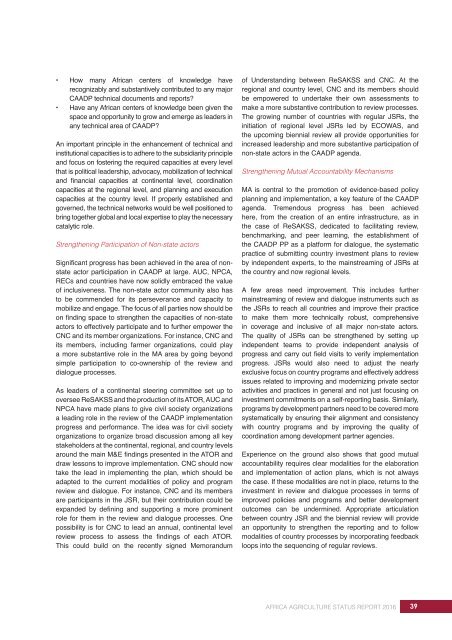AFRICA AGRICULTURE STATUS REPORT 2016
AASR-report_2016-1
AASR-report_2016-1
Create successful ePaper yourself
Turn your PDF publications into a flip-book with our unique Google optimized e-Paper software.
• How many African centers of knowledge have<br />
recognizably and substantively contributed to any major<br />
CAADP technical documents and reports?<br />
• Have any African centers of knowledge been given the<br />
space and opportunity to grow and emerge as leaders in<br />
any technical area of CAADP?<br />
An important principle in the enhancement of technical and<br />
institutional capacities is to adhere to the subsidiarity principle<br />
and focus on fostering the required capacities at every level<br />
that is political leadership, advocacy, mobilization of technical<br />
and financial capacities at continental level, coordination<br />
capacities at the regional level, and planning and execution<br />
capacities at the country level. If properly established and<br />
governed, the technical networks would be well positioned to<br />
bring together global and local expertise to play the necessary<br />
catalytic role.<br />
Strengthening Participation of Non-state actors<br />
Significant progress has been achieved in the area of nonstate<br />
actor participation in CAADP at large. AUC, NPCA,<br />
RECs and countries have now solidly embraced the value<br />
of inclusiveness. The non-state actor community also has<br />
to be commended for its perseverance and capacity to<br />
mobilize and engage. The focus of all parties now should be<br />
on finding space to strengthen the capacities of non-state<br />
actors to effectively participate and to further empower the<br />
CNC and its member organizations. For instance, CNC and<br />
its members, including farmer organizations, could play<br />
a more substantive role in the MA area by going beyond<br />
simple participation to co-ownership of the review and<br />
dialogue processes.<br />
As leaders of a continental steering committee set up to<br />
oversee ReSAKSS and the production of its ATOR, AUC and<br />
NPCA have made plans to give civil society organizations<br />
a leading role in the review of the CAADP implementation<br />
progress and performance. The idea was for civil society<br />
organizations to organize broad discussion among all key<br />
stakeholders at the continental, regional, and country levels<br />
around the main M&E findings presented in the ATOR and<br />
draw lessons to improve implementation. CNC should now<br />
take the lead in implementing the plan, which should be<br />
adapted to the current modalities of policy and program<br />
review and dialogue. For instance, CNC and its members<br />
are participants in the JSR, but their contribution could be<br />
expanded by defining and supporting a more prominent<br />
role for them in the review and dialogue processes. One<br />
possibility is for CNC to lead an annual, continental level<br />
review process to assess the findings of each ATOR.<br />
This could build on the recently signed Memorandum<br />
of Understanding between ReSAKSS and CNC. At the<br />
regional and country level, CNC and its members should<br />
be empowered to undertake their own assessments to<br />
make a more substantive contribution to review processes.<br />
The growing number of countries with regular JSRs, the<br />
initiation of regional level JSRs led by ECOWAS, and<br />
the upcoming biennial review all provide opportunities for<br />
increased leadership and more substantive participation of<br />
non-state actors in the CAADP agenda.<br />
Strengthening Mutual Accountability Mechanisms<br />
MA is central to the promotion of evidence-based policy<br />
planning and implementation, a key feature of the CAADP<br />
agenda. Tremendous progress has been achieved<br />
here, from the creation of an entire infrastructure, as in<br />
the case of ReSAKSS, dedicated to facilitating review,<br />
benchmarking, and peer learning, the establishment of<br />
the CAADP PP as a platform for dialogue, the systematic<br />
practice of submitting country investment plans to review<br />
by independent experts, to the mainstreaming of JSRs at<br />
the country and now regional levels.<br />
A few areas need improvement. This includes further<br />
mainstreaming of review and dialogue instruments such as<br />
the JSRs to reach all countries and improve their practice<br />
to make them more technically robust, comprehensive<br />
in coverage and inclusive of all major non-state actors.<br />
The quality of JSRs can be strengthened by setting up<br />
independent teams to provide independent analysis of<br />
progress and carry out field visits to verify implementation<br />
progress. JSRs would also need to adjust the nearly<br />
exclusive focus on country programs and effectively address<br />
issues related to improving and modernizing private sector<br />
activities and practices in general and not just focusing on<br />
investment commitments on a self-reporting basis. Similarly,<br />
programs by development partners need to be covered more<br />
systematically by ensuring their alignment and consistency<br />
with country programs and by improving the quality of<br />
coordination among development partner agencies.<br />
Experience on the ground also shows that good mutual<br />
accountability requires clear modalities for the elaboration<br />
and implementation of action plans, which is not always<br />
the case. If these modalities are not in place, returns to the<br />
investment in review and dialogue processes in terms of<br />
improved policies and programs and better development<br />
outcomes can be undermined. Appropriate articulation<br />
between country JSR and the biennial review will provide<br />
an opportunity to strengthen the reporting and to follow<br />
modalities of country processes by incorporating feedback<br />
loops into the sequencing of regular reviews.<br />
<strong>AFRICA</strong> <strong>AGRICULTURE</strong> <strong>STATUS</strong> <strong>REPORT</strong> <strong>2016</strong><br />
39


